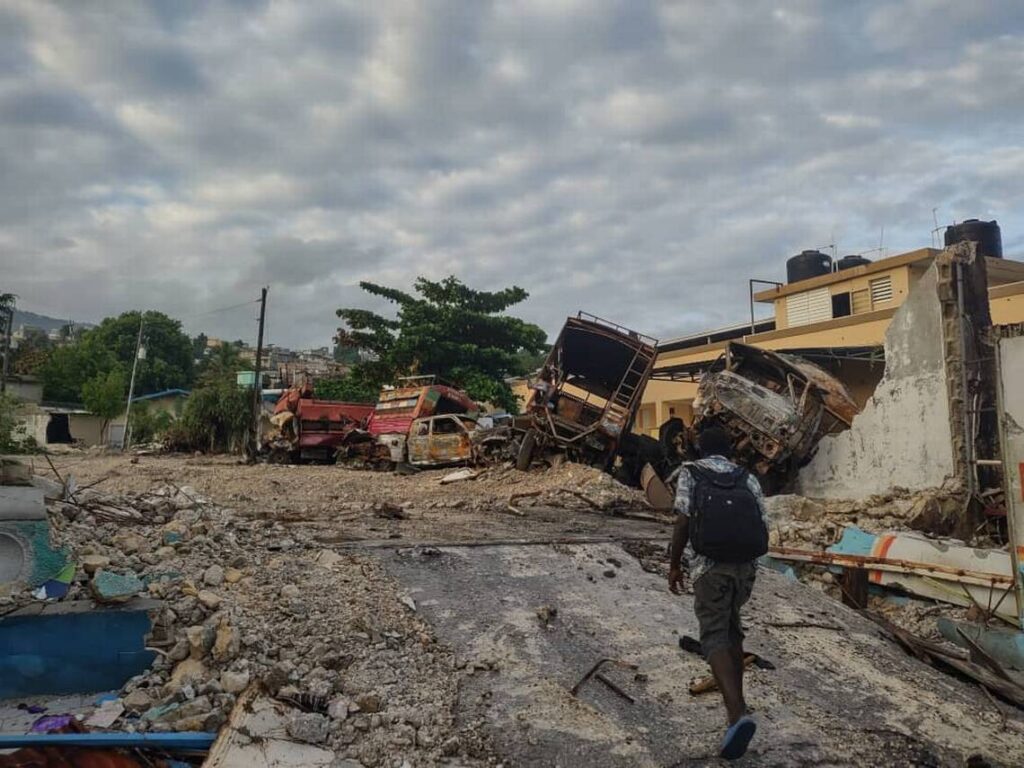PORT-AU-PRINCE — Days after a Catholic mission that treats up to 30,000 poor people a year became the latest target of armed gangs in a new wave of coordinated attacks, the Biden administration deported dozens of people back to Haiti in the midst of worsening humanitarian conditions and rampant violence.
An Immigration and Customs Enforcement charter flight left from Miami on Thursday morning and landed at Toussaint Louverture International Airport in Port-au-Prince shortly after 1 p.m. Haitian authorities had been told to expect 77 people onboard the aircraft, which like a U.S. deportation flight last month arrived in the volatile Caribbean country amid a surge in ramped up attacks by the gang coalition known as Viv Ansanm, Haitian Creole for Living Together.
For weeks, heavily armed Viv Ansanm members have been launching attacks on multiple fronts, overstretching the Haiti National Police, the country’s small army and the Kenya-led multinational police force. The spreading violence has caused widespread hunger and triggered mass displacements. Thousands of Haitians living in and around the capital, in its outskirts and in the neighboring Artibonite region have been forced to flee their homes. The United Nations’ International Organization for Migration said. Since the start of this latest violence, more than 21,000 people have been displaced, including residents in the town of Arcahaie, which has had 12 days of successive attacks.

Armed members of the Viv Ansanm gang coalition targeted the compound of the Missionaries of Charity, a religious congregation in Port-au-Prince’s Delmas neighborhood that Mother Teresa opened in 1979. They looted and burned the sisters’ convent and hospital on October 26, 2024.
On Saturday, Viv Ansanm members targeted the compound of the Missionaries of Charity, a religious congregation in Port-au-Prince’s Delmas neighborhood that Mother Teresa opened in 1979. After breaking into the nuns’ home, gang members looted the convent and hospital, then set them on fire. Though many people in the area have been injured or killed by the intense violence, none of the nuns were injured because police had asked the order to leave the area in August after shootings picked up in the area, according to one of the nuns.
The sisters provide free healthcare to 30,000 people a year through an outpatient clinic, and offered free hospitalization to hundreds. The incident marked the first time that the beloved religious community, which has been serving the poor population in the Lower Delmas community of the capital for nearly 50 years, was attacked. “Many houses were set on fire. People had to leave their homes and lost everything,” the nun said. “This fight has been going on for a very long time, but nobody thought they would touch the sisters’ house because everyone in the neighborhood knew how much the poor people of the area benefited from the free service of the sisters, especially in terms of free medical care.”
The resurgence in violence is unfolding as both the political and security situation in Haiti worsens. Despite the presence of 416 foreign police and soldiers, the Multinational Security Support has not been able to get the violence under control due to a lack of resources and personnel. On Wednesday, El Salvador became the latest country to join the effort, approving a proposal to send a contingent of soldiers to assist with medical evacuations.
It’s unclear how many Salvadorian soldiers will be involved or if they will be stationed in Port-au-Prince or in the Dominican Republic, which has agreed to provide care for injured members of the multinational mission and a holding space for its helicopters. Earlier this month, Dominican President Luis Abinader’s government announced the deportations of up to 10,000 Haitians a week, sparking fury and exacerbating an already tense situation in Haiti. The country, along with the U.S. and the Turks and Caicos, has continued to return Haitians despite calls by the U.N. and others to halt deportations due to the worsening crisis. In recent weeks, smugglers have abandoned Haitians on remote islands off Puerto Rico’s coasts.
Last week, gunmen targeted two U.S. embassy armored vehicles as well as a U.N. World Food Program helicopter with 18 people aboard flying over Port-au-Prince. No one was hurt in either case. But the chopper incident led to a temporary suspension of flights by Spirit Airlines, JetBlue Airways and the U.N. The U.S. State Department planned to evacuate 20 non-essential diplomatic staff, a source told the Miami Herald.
The U.N. says gang violence has forced more than 110,000 Haitians to flee their homes in the last seven months, bringing the total number of people internally displaced to more than 700,000.
After temporarily halting deportation flights, the U.S. resumed them into Port-au-Prince on Sept. 26, a week after armed gangs slaughtered at least 115 people in the central Haitian town of Pont-Sondé, north of the capital. Until last month, U.S. deportation flights had been arriving in the northern coastal city of Cap-Haïtien, where the longtime director of the regional migration office was recently murdered.
Thursday’s flight made a stop in Kingston, Jamaica, before arriving in Port-au-Prince, said Thomas Cartwright, an independent analyst who tracks ICE deportation flight. There was no filed flight plan for Thursday’s flight, Cartwright said, presumably due to safety concerns over ongoing gang violence in Haiti’s capital.
The flight’s arrival was confirmed by several Haitian authorities to the Herald after DHS did not respond to a request for comment. For years, the U.N. and immigration rights advocates have urged that the United States stop deportations to Haiti.
By JACQUELINE CHARLES and SYRA ORTIZ BLANES/Miami Herald

